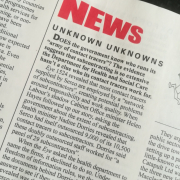Theranos and FOMO as a Cause of Bad Buying
(Two posts in a row about blood – that’s a bit weird)!
Earlier this month, Elizabeth Holmes went on trial in San Jose, California, accused of six counts of fraud. That relates to the blood-testing firm she founded and ran, Theranos, which was claimed to use unique technology to perform a range of tests with just a small sample of blood. The claims were later revealed to be largely nonsense and in some cases the results might even have proved misleading or dangerous to the user. When one of the Theranos laboratories was inspected in Newark, California, in November 2015, the inspectors concluded that “the deficient practices of the laboratory pose immediate jeopardy to patient health and safety.”
The cautionary tale has been turned into a best-selling, award-winning and definitive book, Bad Blood by John Carreyrou and is going to be the subject of a film with Jennifer Lawrence playing Holmes. But in real life, it seems that her defence during the trial may claim she was under the influence of her older and more experienced business partner and one-time boyfriend, Ramesh Balwani. They may also claim that she really did believe in the product and it was others within the firm who misled her about the actual way it worked (or didn’t).
Although some experts warned from the early days of Theranos that there were questions to be answered about the product, Theranos raised hundreds of millions in investment from famous people such as Henry Kissinger and Rupert Murdoch. Perhaps they were dazzled by this confident, smart young blonde woman, who seemed to be particularly effective at persuading older men to stump up large investments!
But as well as the investment aspect to the story, there was also a Bad Buying link to the events. Here is how I described it in my book (“Bad Buying – How organizations waste billions through failure, fraud and f*ck-ups)”.
“Buying failure comes into this because the pharmacy chain Walgreens spent $140 million with Theranos over seven years, hosting around forty blood-testing centres in their stores. They got very little benefit from that and recovered some $30 million after a lawsuit and settlement following the eventual disclosure of the issues. Amazingly, as Bad Blood reports, Walgreens’s own laboratory consultant, Kevin Hunter, had seen early on that something wasn’t right with Theranos. But the executive in charge of the programme at Walgreens said that the firm should pursue the pilot because of the risk that CVS, their big competitor, would beat them to a Theranos deal.
Again, buyers wanted to believe that something was real, even in the face of mounting evidence that it wasn’t. This relates back to comments around believing the supplier– those earlier examples weren’t demonstrating fraudulent behaviour, but the principle is similar. It is easy for a naive or gullible buyer to be sucked into believing what the supplier wants them to believe.
Suppliers will take advantage of this tendency – whether it is the relatively innocent ‘Yes, we can install this new IT system in six months’ or the more dangerous ‘This equipment will find hidden bombs’. And FOMO – the fear of missing out to the competition – is something else suppliers will use, and that can lead to bad decisions. It’s not just physical goods, either. The top consulting firm selling its latest ‘strategy toolkit’ will mention that the potential client’s biggest rival is also very interested”.
So the message is – treat claims made by suppliers about their products with caution, maybe even with a touch of cynicism if they seem unique, outlandish or truly earth-shattering! And don’t let FOMO take you into the realms of Bad Buying.









Leave a Reply
Want to join the discussion?Feel free to contribute!